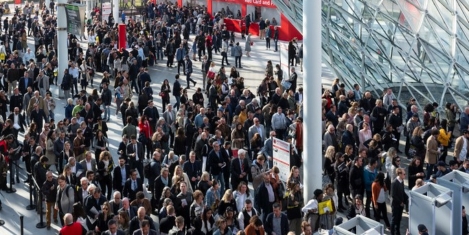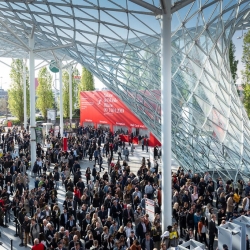To provide the best experiences, we use technologies like cookies to store and/or access device information. Consenting to these technologies will allow us to process data such as browsing behaviour or unique IDs on this site. Not consenting or withdrawing consent, may adversely affect certain features and functions.
The technical storage or access is strictly necessary for the legitimate purpose of enabling the use of a specific service explicitly requested by the subscriber or user, or for the sole purpose of carrying out the transmission of a communication over an electronic communications network.
The technical storage or access is necessary for the legitimate purpose of storing preferences that are not requested by the subscriber or user.
The technical storage or access that is used exclusively for statistical purposes.
The technical storage or access that is used exclusively for anonymous statistical purposes. Without a subpoena, voluntary compliance on the part of your Internet Service Provider, or additional records from a third party, information stored or retrieved for this purpose alone cannot usually be used to identify you.
The technical storage or access is required to create user profiles to send advertising, or to track the user on a website or across several websites for similar marketing purposes.
 The UK is ignoring the value of millions of workers by overlooking workplace training and opportunities to upskill, a new survey has suggested. According to the Missing Millions report from City & Guilds Group, a third of employees have either not received workplace training in the last five years or have never had any such training – equating to 17.8 million people in the UK with outdated skills. The result, the report claims, is declining productivity and problems remaining competitive. (more…)
The UK is ignoring the value of millions of workers by overlooking workplace training and opportunities to upskill, a new survey has suggested. According to the Missing Millions report from City & Guilds Group, a third of employees have either not received workplace training in the last five years or have never had any such training – equating to 17.8 million people in the UK with outdated skills. The result, the report claims, is declining productivity and problems remaining competitive. (more…)







 Three quarters of organisations say access to market opportunities is their key motivation for international expansion, according to a report. Businesses also named access to specialist skills as one of the main factors that influence their international growth ambitions (cited by 67 percent), alongside proximity to suppliers and resources (66 percent) and access to affordable labour (55 percent).
Three quarters of organisations say access to market opportunities is their key motivation for international expansion, according to a report. Businesses also named access to specialist skills as one of the main factors that influence their international growth ambitions (cited by 67 percent), alongside proximity to suppliers and resources (66 percent) and access to affordable labour (55 percent). 
 Two thirds of UK business leaders expect developments in technology to lead to an increase in the number of permanent jobs created this year, a survey has suggested. The South West and Wales region is the most confident about the impact of new technology, with nearly three quarters of businesses anticipating jobs growth, compared to 56 percent in the least optimistic region, the North of England.
Two thirds of UK business leaders expect developments in technology to lead to an increase in the number of permanent jobs created this year, a survey has suggested. The South West and Wales region is the most confident about the impact of new technology, with nearly three quarters of businesses anticipating jobs growth, compared to 56 percent in the least optimistic region, the North of England. 


 A problem shared may be a problem halved but, according to a new
A problem shared may be a problem halved but, according to a new 
 With less than a month to go before the government sets out its economic predictions in its first spring budget, new research points to a 30 percent increase in people planning to start a business or register as self-employed this year. With 1.4 million new limited company or self-employed registrations in 2019, 2020 could see that rise to as many as 1.8 million new registrations,
With less than a month to go before the government sets out its economic predictions in its first spring budget, new research points to a 30 percent increase in people planning to start a business or register as self-employed this year. With 1.4 million new limited company or self-employed registrations in 2019, 2020 could see that rise to as many as 1.8 million new registrations, 
 By 2050, cars will be completely driverless, electric and kitted out for hosting business meetings on the go, a
By 2050, cars will be completely driverless, electric and kitted out for hosting business meetings on the go, a 
 One in three US workers have told researchers nothing would stop them from taking advantage of flexible working options, despite the potential damage to their career. According to a
One in three US workers have told researchers nothing would stop them from taking advantage of flexible working options, despite the potential damage to their career. According to a 
 In response to the coronavirus outbreak,
In response to the coronavirus outbreak, 
 Today is the first productive day of the year for UK employees, according to new research which claims 38 working days were lost, on average, by each employee last year due to physical and mental health related absence and presenteeism. The study puts the cost to businesses and the economy of these lost days (which in reality are of course spread out across the whole year) at £91.9bn in 2019, an increase of more than £10bn on 2018.
Today is the first productive day of the year for UK employees, according to new research which claims 38 working days were lost, on average, by each employee last year due to physical and mental health related absence and presenteeism. The study puts the cost to businesses and the economy of these lost days (which in reality are of course spread out across the whole year) at £91.9bn in 2019, an increase of more than £10bn on 2018. 
 A new analysis of the UK’s job market claims there were 52 percent fewer available jobs listed for professionals with technology skills at the end of 2019, compared to six months earlier.
A new analysis of the UK’s job market claims there were 52 percent fewer available jobs listed for professionals with technology skills at the end of 2019, compared to six months earlier. 
 The European Commission has put forward a strategy to promote the development of AI and robotics while putting people first and defending European values and rights. The strategy acknowledges that AI can open up new opportunities for businesses and bring solutions to challenges such as climate change. However, it aims to address the social, legal and ethical impact of new technology.
The European Commission has put forward a strategy to promote the development of AI and robotics while putting people first and defending European values and rights. The strategy acknowledges that AI can open up new opportunities for businesses and bring solutions to challenges such as climate change. However, it aims to address the social, legal and ethical impact of new technology. 







